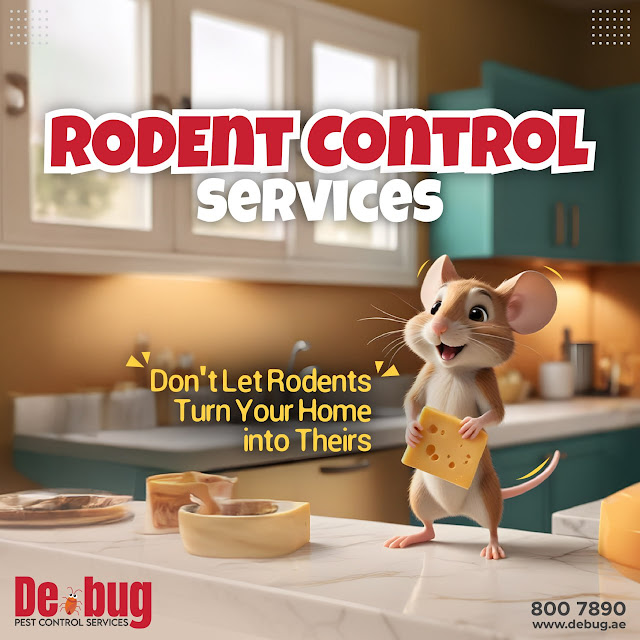Rodent infestations can disrupt business operations, damage property, and tarnish a company’s reputation, particularly in sectors such as food service, hospitality, and retail. In Abu Dhabi, where urbanization and climate conditions can heighten the risk of infestations, businesses must take proactive measures to prevent and respond to rodent issues. A well-prepared business can minimize the damage caused by rodents through regular inspections, employee training, and effective management strategies. Here's how to prepare your business for potential rodent infestations.
Conduct Regular Inspections
Importance of Regular Inspections
Routine inspections are essential to identify early signs of a rodent infestation. Regular checks of key areas, such as storage rooms, kitchens, and utility spaces, can help detect rodent activity before it escalates into a full-blown infestation. Early detection minimizes damage, reduces health risks, and lowers control costs.
Key Areas to Inspect
Entry Points: Rodents can squeeze through tiny gaps. Inspect doors, windows, vents, and any openings in walls or foundations regularly. Ensure that doors have tight seals and that windows and vents are properly screened.
Storage and Food Areas: Pay close attention to areas where food is stored or handled. Rodents are attracted to food and waste, so maintaining cleanliness and inspecting food storage for gnaw marks or droppings is critical.
Plumbing and Utility Rooms: Rodents are known to nest in utility rooms or near plumbing. Check for leaks or any signs of rodent activity, such as nests, chewed pipes, or droppings.
Schedule Inspections
Weekly Visual Inspections: Employees should conduct quick, weekly visual inspections, checking for any visible signs of rodent activity.
Monthly Professional Inspections: Hire a professional pest control service to perform thorough monthly inspections. These experts can identify more subtle signs of infestations and recommend preventive measures.
Seal Entry Points and Eliminate Attractants
Seal Gaps and Cracks
Rodents can enter through cracks as small as a quarter of an inch. To prevent this, ensure that all openings around pipes, electrical wiring, and foundation gaps are sealed with durable materials such as metal mesh or concrete.
- Tip: Use door sweeps and weather stripping to close gaps under doors and around windows.
Maintain Proper Waste Management
Proper waste disposal is key to preventing rodent infestations. Rodents are attracted to food waste, so make sure that trash bins are tightly sealed and emptied regularly. Implement a strict cleaning schedule for areas where food is prepared, served, or stored.
- Tip: Store waste bins away from the building to prevent attracting rodents to the premises.
Store Food Properly
In businesses that handle food, such as restaurants, proper food storage is essential. Store food in rodent-proof containers and make sure that storage areas are clean and organized. Avoid leaving food out overnight, and ensure that all spills and crumbs are cleaned immediately.
Train Employees to Recognize and Report Signs of Infestation
Employee Training
Training employees to recognize early signs of rodent activity is one of the most effective ways to prevent an infestation from escalating. Employees should be trained to spot:
Rodent Droppings: Small, pellet-shaped droppings are a common sign of rodent activity.
Gnaw Marks: Rodents constantly chew on materials to keep their teeth sharp. Look for gnaw marks on furniture, wires, and food containers.
Nests: Rodents often create nests from soft materials like shredded paper, fabric, or insulation.
Odor: A strong, musky odor can indicate a rodent infestation.
Reporting Procedures
Create a clear process for reporting potential signs of rodent activity. Employees should know who to report to and how quickly action needs to be taken. Immediate reporting allows management to address the problem before it becomes severe.
- Tip: Regularly remind staff of the importance of reporting even minor signs of rodent activity, as these may indicate an early infestation.
Implement a Preventive Pest Control Plan
Hire Professional Pest Control Services
A comprehensive rodent control plan is essential for businesses, especially those in sectors that handle food or have high customer traffic. Professional pest control services in Abu Dhabi can provide regular monitoring, rodent-proofing recommendations, and preventive treatments.
- Tip: Opt for a pest control provider with eco-friendly solutions to minimize environmental impact and maintain a sustainable business model.
Integrated Pest Management (IPM)
Adopt an Integrated Pest Management (IPM) approach, which focuses on long-term prevention through a combination of biological, mechanical, and chemical control methods. IPM emphasizes minimizing the use of harmful chemicals and instead relies on thorough monitoring, habitat modification, and education.
- Tip: Ensure that your pest control provider uses IPM techniques that align with your business's environmental policies.
Create an Action Plan for Infestations
Develop a Response Plan
In the event of a rodent infestation, it's essential to have a clear, pre-established action plan. This plan should include:
Immediate Containment: Isolate the affected areas to prevent further contamination or damage. Remove all food from these areas and block rodent entry points.
Engage Professional Services: Contact your pest control provider immediately for a thorough inspection and elimination plan.
Communication with Employees and Customers: If the infestation affects business operations, communicate the issue to staff and, if necessary, to customers. Ensure that the infestation is addressed before reopening affected areas.
Follow-Up Measures
Once the infestation is under control, conduct follow-up inspections and treatments to prevent recurrence. Implement any recommendations from pest control professionals to enhance long-term prevention.
By preparing your business for potential rodent infestations, you can minimize risks to your property, reputation, and bottom line. Regular inspections, employee training, effective waste management, and the implementation of a preventive pest control plan are essential steps to ensure your business remains rodent-free. In Abu Dhabi, where environmental factors can exacerbate rodent problems, proactive preparation is key to maintaining a safe and healthy work environment.

Comments
Post a Comment